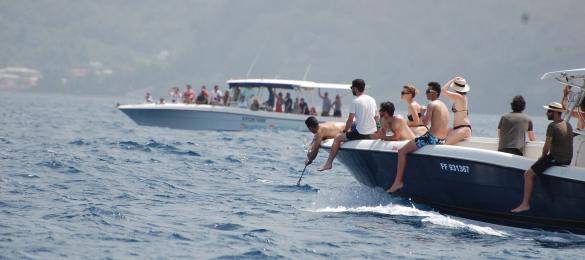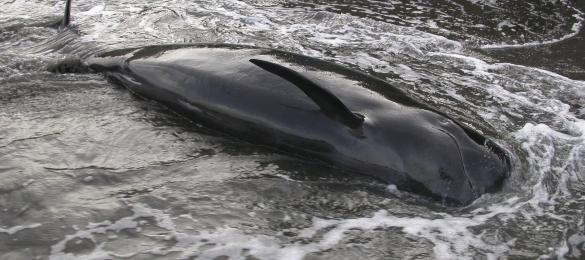I report a stranded or distressed animal
What is a stranding?
A marine mammal is said to be stranded when it lies on the shore, dead, or alive but unable to return to the open sea by its own means.
There are 3 types of stranding:
- Individual stranding concerns a single individual, stranded independently of the individuals in its group.
- Multiple strandings are characterised by a large number of individuals stranded in a limited geographical area and in a short time interval. These individuals may belong to different species.
- Mass stranding is when several individuals of the same species and social group are stranded simultaneously.
Strandings are rather rare events on the coasts of the French West Indies (generally less than a dozen per year). They mainly concern delphinids.
The term "animal in distress" can be used when it is not stranded on the shore but when it is in a situation that could lead to its death. Human intervention can then save it. This is most often the case for animals entangled in fishing nets or plastic waste, trapped in coastal installations such as aquaculture cages or port infrastructures, or even disoriented and trapped in a bay without being able to leave.
What are the other causes for strandings?
There are natural causes related to the vulnerability of certain individuals (young or pregnant females), to pathologies, or to predation by other species.
There are many anthropic causes. One of the main ones is undoubtedly the accidental capture in fishing gear. We can unfortunately recognise the marks on the stranded bodies. A decrease in resources due to overfishing, collisions with ships, noise pollution (sonar, industrial prospecting), ingestion of waste, chemical pollution are other causes of strandings.
Strandings can also be caused by environmental events such as global climate change or variations in oceanographic conditions.
Learn more about the possible causes of strandings
Learn more about the possible causes of strandings:

Threats faced by marine mammals
Why should strandings be reported and to whom?
Strandings of marine mammals found dead allow scientists to gather biological data that are difficult to acquire by other means. This data allows the improvement of the knowledge of the populations and their health status. The examination of stranded marine mammals is mandatory before their disposal and must be carried out by an authorised person.
Whether they are alive or not, do not handle a stranded marine mammal (risk of contamination and injury) and contact the representative of the national stranding network on your island:
- Martinique: 06 96 03 02 04 (ROCEM)
- Guadeloupe: 06 90 57 19 44 (Network of marine mammal strandings in the Guadeloupe archipelago)
- Saint-Barthélemy: 06 90 31 70 73 (Territorial Environnent Agency)
- Saint-Martin: 06 90 38 77 71 (Saint-Martin Nature Reserve)
A qualified person will go as quickly as possible to examine the animal.
The National Stranding Network
The National Stranding Network (RNE) was set up in 1972. It is made up of 461 volunteer local correspondents, trained and ready to intervene in the event of a marine mammal stranding. RNE contact-persons may be associations, state organisations, communities or even private volunteers. They are spread out over all the French coastlines. The network is coordinated by the PELAGIS Observatory.


